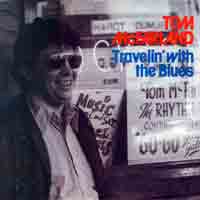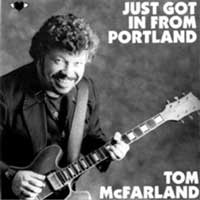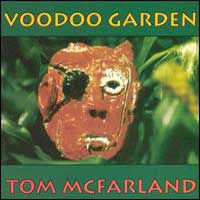| Archiveintrag #415 (442061) | |||||||||||||||||||||||
 #14 in Jahresliste #14 in Jahresliste  Plattentipp Plattentipp |
|||||||||||||||||||||||
|
|
||||||||||||||||||||||


|
Tom McFarland was a blues fixture in the Pacific Northwest and the Bay Area until his death in 2004. So it's perhaps apt that this CD reissue of his first album, recorded in 1978, now finds its way out. That he was a devotee of B.B. King is apparent in the way he uses his guitar to punctuate and accentuate lines, although throughout he chooses a much more brittle tone. And the West Coast attitude is apparent in the sense of easy swing in the original songs, backed by bass and drums -- nothing ever plods. There's an ebullience to McFarland's singing, nowhere more than on the bonus cut "Tom's Boogie" (one of three extra tracks here), which comes as close to driving along as anything on the disc. His tales of ordinary life, be they about prostitutes or simply trying to make ends meet as a musician, are reassuringly warm, while his signature piece, "Going Back to Oakland," has a real sense of stature. While not a major performer, there's still plenty to his work. Nothing is tossed off or haphazard; there's a real regard for the blues (by Chris Nickson , All Music Guide) |
|
|
|
“Backed only by bass and drums, McFarland's clean guitar lines and no-nonsense vocals ring true to such mentors as B B King, Freddie King and Otis Rush, while his original songs present an artist quite worthy of standing in his own spotlight. McFarland died in September 2004 aged 59 so this reissue of his first major (1978) album (plus 3 extra tracks) provides a timely tribute to a fine musician who never achieved wide fame.” (Folkroots World Music Magazine) |
|
|
|
Listening to Tom McFarland's "Goin' Back to Oakland" on this album conjures up all sorts of Images and feelings about the blues, not least of which are the thoughts of all the blues people who have sung the blues on that side of the Bay at one time or another. "Goin' Back," says McFarland philosophically, "is about getting to where you belong as opposed to all the places you could be." Indeed! For McFarland, of course, that has meant eight years of playing the blues in Portland, Oregon bars under the pseudonym of Sunny Black, followed by another three years in Seattle under his own name before the breakaway to the San Francisco Bay Area blues scene. "I felt if I was ever going to be accepted as a legitimate blues artist l had to be accepted here first." If moving to the Bay Area was getting to where you belong, it also meant giving up some good paying Jobs; however, the probability of recognition coupled with the chance of recording an album outweighed any doubts, and so along with his growing family, he moved to Richmond in 1976. There he quickly cornered a Job at the renowned blues spot, The Playboy, a Richmond bar that had been featuring blues for as long äs anyone could remember. After assembling a group, McFarland ended up performing as the house band for the following eight months with in between guest shots at Eli's in Oakland, where he won over the regular patrons with his soulful singing and guitaring. At Eli's "Goin' Back To Oakland" naturally became a requested favorite, followed by the usual inquiries as to when he was going to put it out on a record. "Oakland deserves more credit than it gets when it comes to the blues," muses McFarland over performing at Eli's. "When I do that song it always gets a warm reception because no matter what, to the people here Oakland is home." And what about Tom McFarland? He was born in Los Angeles in 1945, but spent much of his youth in the tiny rural community of Sunny Valley, Oregon. where his father worked as a logger. His entire family was musical, including his cousin, the late jazz great, Gary McFarland. At ten he began playing guitar and by age 12 was intently listening to the records of Gene Vincent and Elvis Presley, but a brief stay in Los Angeles while attending junior high school resulted in visits to Watts which changed his outlook towards life and music completely. Not long after that he discovered the music of B.B. King, which crystalized his musical ambitions. "B.B. answered all my questions. I knew I was meant to do something musically, but I didn't know what that was until l heard him." This discovery led to other guitarists, such as T-Bone Walker, Freddie King, Scotty Moore, Barney Kessel, Merle Travis, Chet Atkins, and Kenny Burrell, all of whom have influenced McFarland's musicai style. Out of this came the first of many groups, including a stint in 1962 with an authentic R&B band, followed by a hitch in the Army, which resulted in some performances around Europe. In 1966 he moved to Portland, where he formed the first of his many bands
there and a long residency at the White Eagle, a bar where he developed
a loyal following and more than a handful of newspaper clippings to prove
it. However, by 1973, Portland's Vision had quite understandably become
much too myopic for McFarland and he decided to move to Seattle. Now with the release of this album, Tom McFarland appears to have finall completed some of those long awaited goals. He certainly has captured the attention of the Bay Area music scene in two years with his superb performances both in the clubs like the Coffee Gallery and at concerts like the 1977 San Francisco Blues Festival, and while his memorable West Coast tour with Chicago great Otis Rush has garnered him some rave notices, it also established him as an outstanding new blues discovery. I'm sure you will agree after listening to this album, that Tom McFarland is a refreshing new performer with something to say! Just read what he has to say about the songs. "Travelin With The Blues is about the economics of being a blues musician and surviving. You Can't Take It With You is about an existential attitude; paying attention to now. Gasoline Blues is a humorous song about the high price of gasoline, but really it's about sex. You're Killing Me is one of the songs I've been working on for years that gradually came together, it's a general song about a man-woman relationship, but I don't personally identify with it. Goin' Back To Oakland contains my best guitar solo. Street Walkin' Woman is all about prostitutes in Oakland. Juicer's Blues is about drinking. Blues Got Me is about some personal experiences I've had. Blues Up And Gone is a happy blues, actually it's a tribute to my wife. Telephone Blues stems from a past expenence I had with a woman." About the performers: Drummer Bobby Broadhead is a native of the Pacific Northwest and has been regularly associated with Tom McFarland since 1971. He has also worked, primaril in Portland, Oregon, with a number of other blues bands, most notably led by Paul Delay, Steve Bradley and Gordon Keane. Since coming to San Francisco in 1974, Broadhead has played engagements with Lowell Fulson, Lightnin' Hopkins. as well as Otis Rush on his 1977 West Coast tour. Bassist Steve Ehrmann is from Milwaukee, Wisconsin and has lived in the Bay Area for the past five years. He has performed in Milwaukee with Wild Child Butler and has backed Big Walter Horton. Lightnin' Hopkins, Charlie Musselwhite and Sunnyland Slim. (Sleevenotes by Tom Mazzolini, San Francisco May, 1978 ) |
| Track | Titel | Autoren | Aktion |
|---|---|---|---|
| 1 | Traveling With The Blues | Tom McFarland |  |
| 10 | Telephone Blues | Tom McFarland |  |
| mehr von " Tom McFarland" | |||
 |
Tom McFarland | "Just Got In From Portland" | |
| Flying Heart (Mai 1987) | |||
 |
Tom McFarland | "Voodoo Garden" | |
| Flying Heart (1990) | |||
| Zurück |
|
Oben |
| Erstellt: 07.2003 | Letzte Aktualisierung: 19.09.2021 17:44 | 74147 Besucher seit dem 12.09.2021 |
| Homepage im neuen Fenster | We’re Waiting For Louise! | © Webmaster: |